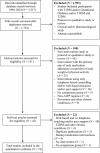A systematic review of diabetes self-management education interventions for people with type 2 diabetes mellitus in the Asian Western Pacific (AWP) region
- PMID: 31660170
- PMCID: PMC6805261
- DOI: 10.1002/nop2.340
A systematic review of diabetes self-management education interventions for people with type 2 diabetes mellitus in the Asian Western Pacific (AWP) region
Abstract
Aims and objectives: To assess the effectiveness of educational and/or psychological diabetes self-management education (DSME) intervention for people with type 2 diabetes (T2DM) in the Asian Western Pacific (AWP) region.
Background: Translational research indicates that DSME is effective; therefore, it is important to look at the AWP region to see what has been implemented and what the potential barriers are for the low integration of DSME. The need for DSME is present, and programmes are being developed. Therefore, focusing a systematic review of DSME research in the AWP region would give a better understanding of which intervention approaches are associated with better clinical outcomes and are culturally acceptable.
Design: A systematic review.
Methods: A review of randomized controlled trials (RCTs) and comparative studies to evaluate the effectiveness of face-to-face delivery reporting educational and/or psychological interventions for people with T2DM was implemented. We conducted searches using MEDLINE, EMBASE, CINAHL, PubMed and ASSIA databases between January 1990-June 2018. Studies published in English and non-English were included. Two reviewers independently extracted data on participant and intervention characteristics. The quality of evidence was rated on predetermined criteria. Main outcomes included glycaemic control (reduction in HbA1c level).
Results: We included 21 DSME programmes (17 RCTs), while 15 were group-based approaches. Twelve studies (60%) were categorized as high quality. Three studies (25%) had a moderate (good) effect. Eight trials were effective in improving glycaemic control and reported statistically significant improvements in HbA1c levels. 50% of these were high-intensity group-based programmes.
Keywords: Asian Western Pacific region; diabetes self‐management education; interventions; systematic review; type 2 diabetes mellitus.
© 2019 The Authors. Nursing Open published by John Wiley & Sons Ltd.
Conflict of interest statement
None.
References
-
- American Diabetes Association (2004). Diagnosis and classification of diabetes mellitus. Diabetes Care, 27(Supplement 1), S5–S10. - PubMed
-
- Beck, A. T. (1976). Cognitive therapy and the emotional disorders. Oxford, England: International Universities Press.
LinkOut - more resources
Full Text Sources


